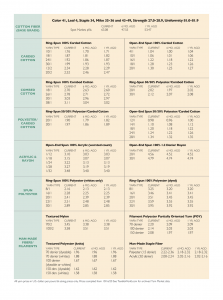Visits: 44
 By Jim Phillips, Yarn Market Editor
By Jim Phillips, Yarn Market Editor
The recent announcement by Cone Denim that it would work to adopt the highest levels of end-to-end traceability is a significant step forward in helping instill consumer confidence in the safety and authenticity of the cotton yarn and fabrics they buy.
Cone, part of Elevate Textiles, will partner with Oritain, a product and supply-chain specialist, that uses a unique method that “combines forensic science and statistics to detect naturally occurring elements in the cotton, eliminating the need for additional foreign tracers such as spray or particles. Soil composition and other environmental factors give the cotton an inherent “fingerprint” specific to each location.” Oritain calls this the “Origin Fingerprint.” Once such fingerprints have been created, they — unlike other traceability systems — cannot be tampered with, replicated, or destroyed. Oritain says product can be tested at any point in the supply chain to verify origin claims.
Product traceability is an integral part of the complete transparency that today’s consumers are increasingly demanding. “Until recently, packaging and a product’s intrinsic attributes, such as those things a consumer could see, touch or taste, were the primary drivers of purchasing behavior,” said one noted traceability expert. “Today, these things are still relevant, but other factors, such as traceability, transparency and sustainability, have taken on added importance.”
The need for product traceability became apparent more than a decade ago when a spate of food and consumer product contaminations caused death, illness and injury to a number people all over the world. Corrupted peanut butter, romaine lettuce and other food products caused multiple deaths and sickened hundreds. Children were poisoned by lead paint flakes from toy fire trucks made in China. Supposedly fire-retardant materials easily burst into flames. “All of these factors contributed to an increasing consumer demand for traceability and accountability,” a consumer products consultant said. Consumers want to be assured that the products they were buying with both safe and authentic. “People wanted to know more than just what is on the label. Where did the product originate? Who handled it and when? Were there any additives? Where was it and with whom at every point in the supply chain?”
The demand for traceability goes even beyond the basic attributes of a product, he said. “What are the policies of the companies that make the products and the farmers who grow the food? Do they treat their people well? Are they ethical in the ways they conduct business? Are their practices environmentally friendly?”
In addition to helping keep products safe for consumers, traceability also helps to decrease counterfeiting, which costs U.S. companies — including textile and apparel manufacturers — billions of dollars per year. “The number of counterfeit products sold in this country is staggering,” said the traceability expert. “From DVDs, to cell phones, to golf clubs, to designer clothes, fake products are permeating the marketplace. And there only a few ways to make sure you are getting what you are paying for. You need either transparent traceability programs or you need to restrict your purchases to well-established companies that will stand behind their products. Private e-commerce and auction sites, for example, are a haven for counterfeiters because there is little-to-no traceability. Complete traceability guarantees you know where the product is from, what it contains, and who has touched it every step along the way.”
Yarn, Fabric Manufacturers Embrace Traceability
And while food and consumer products were the pioneers in product traceability, other companies, such as Cone Denim, are beginning to realize how valuable such an endeavor can be. According to Cone, its latest partnership with Oritain reaffirms the company’s long history of innovation and commitment to sustainability and responsible sourcing.
Steve Maggard, president, Cone Denim said: “Traceability and sustainability are no longer just industry buzzwords but strong-held values fast becoming the gold standard for our customers and the consumer. Our partnership with Oritain enables Cone Denim to be the first denim mill globally with the ability to provide documentable transparency admissible in a court of law, underpinning sustainable and ethical sourcing claims. Through scientific verification of cotton origin, customers can be assured that Cone Denim products do not contain any cotton from prohibited regions, offering an elevated level of confidence and scientific peace of mind to our customers and our wider stakeholders.”
He continued: “Innovation and sustainability are as integral to our company as is the cotton in our denims. Through this partnership we are able to combine sustainable innovation with industry leading traceability. Oritain’s advanced science requires no changes to the manufacturing processes, giving us flexibility, scalability and ease of implementation, which are critical factors for us to provide our customers with the best product.”
Rupert Hodges, chief strategy officer for Oritain, said: “Traceability is a prerequisite for understanding your environmental, ethical and social impact. Manufacturers, brand owners and retailers are increasingly focused on ensuring there is transparency within their supply chains. A huge part of this is knowing and trusting where their product comes from, especially when claiming a certain provenance or ethical standard.”
While Cone is the latest textile company to embrace traceability, others have done so as well. For example, another Elevate Textiles brand, American & Efird (A&E), began a few years ago manufacturing “Integrity”-branded industrial sewing threads that incorporated anti-counterfeiting technology. “One of the big challenges brands face today centers around authenticity. Loss of revenue, reputation, and brand trust are some of the potential outcomes of counterfeit products,” said Chris Alt, senior vice president of Elevate Textiles. The threads were first previewed at the Texprocess trade show in Frankfurt in 2019.
October 22, 2020


